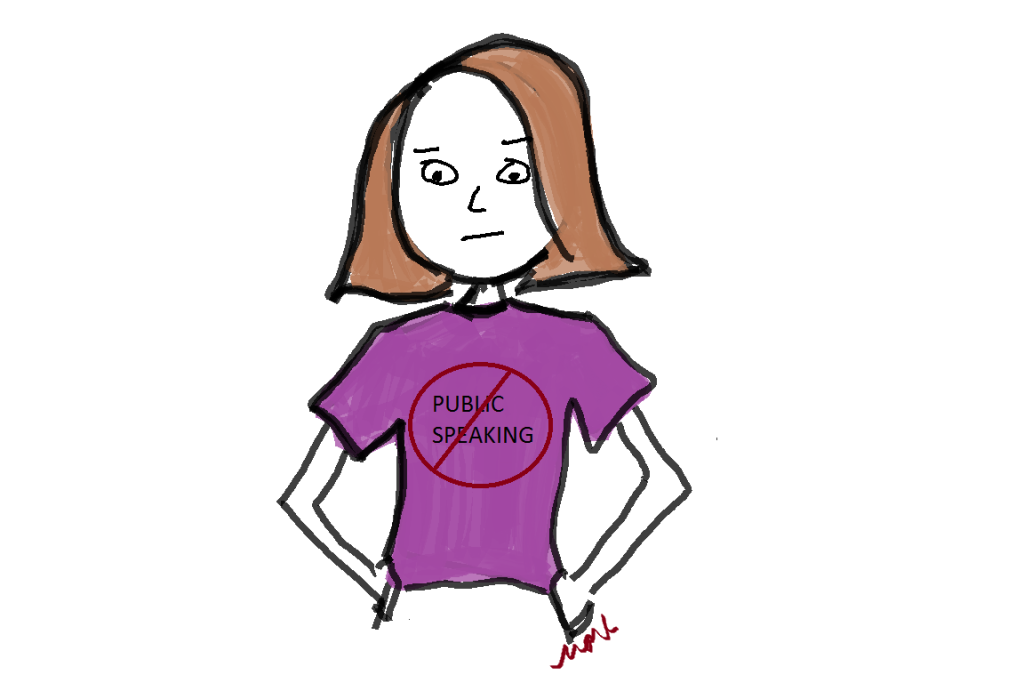 One of the most dreaded components of my Introduction to Communications class is public speaking. Consistently when requesting first-day, “tell me your concerns” feedback from students I learn that they “hate” public speaking. I’m not surprised. Public speaking, I tell my class, is like throwing up. You are put in circumstances that require you to do it, and the closer the event comes the worse you feel. Your palms sweat. You get the shakes. Your stomach turns into a hard ball, your mouth goes dry. But the minute it is over, you feel GREAT. You experience this tremendous, whole body bliss… until the next event comes. But why do we hate this experience so much? What is so bad about it? And how do we best survive?
One of the most dreaded components of my Introduction to Communications class is public speaking. Consistently when requesting first-day, “tell me your concerns” feedback from students I learn that they “hate” public speaking. I’m not surprised. Public speaking, I tell my class, is like throwing up. You are put in circumstances that require you to do it, and the closer the event comes the worse you feel. Your palms sweat. You get the shakes. Your stomach turns into a hard ball, your mouth goes dry. But the minute it is over, you feel GREAT. You experience this tremendous, whole body bliss… until the next event comes. But why do we hate this experience so much? What is so bad about it? And how do we best survive?
FEAR
I ask my classes why public speaking is so scary. The answers are always the same:
- I might freeze up there!
- I might forget everything.
- I could stutter, stammer, slur…
- I might throw up.
- I just might pee.
…and as a result of these,
- People will think I sound stupid!
 In all of my years as a student, professional and instructor, I have never seen anyone completely fail. Not one. Sure, some speeches have been bumpy, disorganized, silly or boring. But NO ONE has failed who has tried. And consistently the audience is much kinder than you think, because they too know how terrible public speaking can feel. So why do we harbor such horrible fear and predict the worst?
In all of my years as a student, professional and instructor, I have never seen anyone completely fail. Not one. Sure, some speeches have been bumpy, disorganized, silly or boring. But NO ONE has failed who has tried. And consistently the audience is much kinder than you think, because they too know how terrible public speaking can feel. So why do we harbor such horrible fear and predict the worst?
IMAGE
Self-preservation is human instinct. We naturally want to preserve our sense of dignity, and in an individualist culture like ours where winning is our measurement of success, preserving our “face” (or a positive image) is paramount. Standing up in front of a crowd who could be evaluating you is threatening to this image. In public speaking, you are front and center (literally) putting some part of yourself “out there.” SCARY!
When we are scared, our adrenal glands kick in. Those helpful little glands flood our body with adrenaline so we are ready for danger. We are ready for flight or fight. Our heart races, our stomach tightens, our muscles tense and shake. While you are experiencing this hormonal flood and its fallout, your brain starts predicting the worst. As a result your human instinct is to choose “flight”– skip the speech, take a sick day, or pretend you forgot what day it is. But to you I say: STAND UP AND FIGHT.  Think of it this way. Adrenaline is energy. You can choose to use it for good or evil. That’s right. Choose. We are not victims of our chemistry or our fears. We are not required to listen to those negative words in our heads. Our bodies are going to respond instinctually, but we can take that response and decide what we want to do. We can choose to use that adrenaline for the good. It will make you think faster and help you be a more energetic presenter.
Think of it this way. Adrenaline is energy. You can choose to use it for good or evil. That’s right. Choose. We are not victims of our chemistry or our fears. We are not required to listen to those negative words in our heads. Our bodies are going to respond instinctually, but we can take that response and decide what we want to do. We can choose to use that adrenaline for the good. It will make you think faster and help you be a more energetic presenter.
SELF-TALK
The way you use these weapons is through your self-talk. Acknowledge your fear, but rather than saying “I want this over with. I’m going to die. I hate this.” Try saying, “My body is ready. I’m ready.” (and I hope it goes without saying that you are ready—you’ve prepared your presentation and practiced it out loud, multiple times). Go up to that speaking podium thinking, “I’m going to give the best presentation.” Period. No doubts. Stand with confidence. Breath slowly. And tell yourself, “I can do this.”
The way that we speak to ourselves directly affects the communication choices we make and our performance. Our perception is our reality, and we help construct that perception by the way we think and talk to ourselves about it. Yes, maybe your voice quavers. Very rarely is that noticeable to the listener. Maybe you stutter a moment. Who hasn’t? You are not required to be perfect as defined by some unreachable standard.
We humans are miraculous, powerful creatures. Don’t underestimate the power you have. Through your own self-talk, you can create your own reality. Choose wisely and choose intentionally. Choose to use that feeling of adrenaline as the source of energy it is. While you can’t stop the physical manifestations of the adrenaline in your system, you can choose how you interpret that experience. Take that excitement and use it to share your message. Act as a powerful speaker, and you will be one.
